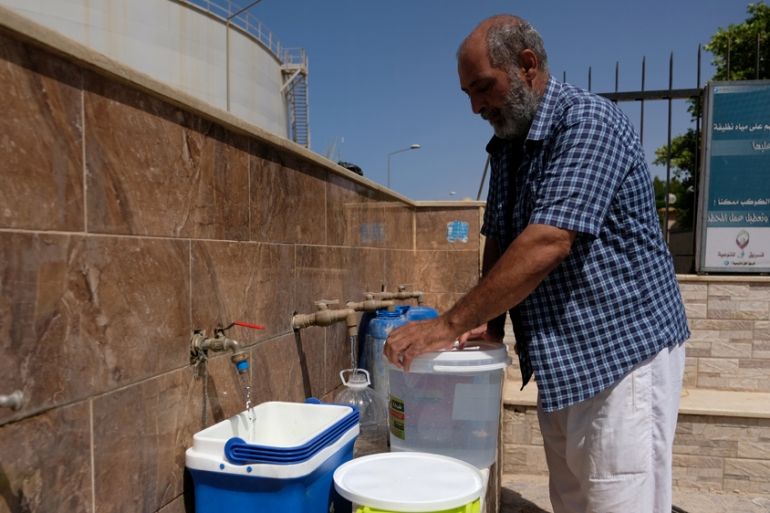Water supply restored to besieged Libyan capital Tripoli
Tripoli government blamed group that is says also cut the water supply in 2017.

The water supply to the 2.5 million residents of Tripoli has been restored two days after they were cut off by gunmen, allowing the besieged capital to escape shortages that could have caused a humanitarian crisis.
Brigadier General Mohammed bin Nayel, a general under Libya‘s renegade commander Khalifa Haftar, said water from the industrial river had begun flowing through its normal routes.
Keep reading
list of 4 itemsWorld Press Freedom Day: Gaza conflict deadliest for journalists
Israeli firms sold invasive surveillance tech to Indonesia: Report
Abu Ghraib: Iraqi victims’ case against US contractor ends in mistrial
“The Great Man-Made River project belongs to all Libyans and will not be affected by Libyan armed forces,” said bin Nayel, who is in charge of the Barak military zone.
The authority in charge of the Great Man-Made River, a pipe network supplying groundwater from the Sahara, also confirmed the resumption of supplies.
“The crisis of halting water supplies has ended and flows have started,” it said in a statement.
Earlier, residents and officials reported that gunmen had cut off the main water pipeline, forcing workers at the facilities to close all flow control valves.
“Cutting off the water supply from the capital Tripoli and its environs by groups following Khalifa Haftar is another act of human rights violations and war crimes,” the government said in a statement issued on Tuesday.
The Tripoli government blamed a group that also cut the water supplies in 2017, saying that its commander, Khalifa Ehnaish, was part of Haftar’s eastern self-proclaimed Libyan National Army (LNA) forces.
However, bin Nayel denied the LNA’s involvement and said what happened was “an accident by an individual that does not represent any region or tribe”.
He also said that military reinforcements would be sent to the water control station to avoid a repeat of the disruption.
The United Nations strongly condemned cutting off the water supply to Tripoli, saying it could amount to a war crime.
UN Humanitarian Coordinator for Libya Maria Ribeiro condemned the act, which “aims to deprive hundreds of thousands of already embattled Libyans of safe drinking water”.
Ribeiro added that continuous attacks on the water system further jeopardised the health and hygiene of the civilian population, particularly those most vulnerable, including children, and caused further hardship and possible displacement.

Last month, Haftar launched an offensive to seize Tripoli from the internationally recognised government led by Fayez al-Sarraj.
Fighting in the battle for Tripoli that began last month has killed at least 510 people, wounded nearly 2,500, forced 75,000 out of their homes, trapped thousands of migrants in detention centres, and flattened some southern suburbs, according to the UN.
It has also forced the closure of schools, split families on different sides of the front line, and caused power-cuts.
The conflict is one of the most serious flare-ups in years of chaos since the 2011 toppling of Gaddafi and has sharpened regional political divisions over Libya.